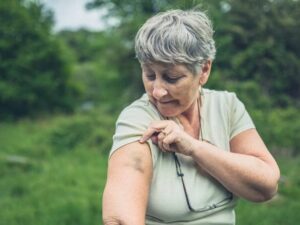 As we age, our skin becomes more susceptible to bruising. Unexplained bruising in seniors can be concerning, but understanding the common causes can help manage and prevent it.
As we age, our skin becomes more susceptible to bruising. Unexplained bruising in seniors can be concerning, but understanding the common causes can help manage and prevent it.
What is a Bruise?
A bruise, or contusion, is a discoloration of the skin caused by blood seeping into the surrounding tissue after small blood vessels break. Bruises often result from a bump or fall but can also appear without a known injury, particularly in older adults.
Thinning Skin
Aging causes the skin to thin and lose its protective fatty layer. This makes blood vessels more fragile and prone to breaking, even with minor bumps or pressure, leading to frequent bruising.
Medications
Certain medications can increase the likelihood of bruising. Blood thinners, aspirin, and corticosteroids can reduce blood clotting or make the skin more sensitive, resulting in easier bruising. Always consult a doctor about medication side effects.
Falls
Seniors are at a higher risk of falls due to decreased balance, vision issues, or weakened muscles. Falls can cause significant bruising and injuries. Preventive measures, like installing grab bars and ensuring proper lighting, can reduce fall risks.
Elder Abuse
Unexplained bruising can sometimes indicate elder abuse. Physical abuse, neglect, or rough handling can leave marks on the skin. If you suspect elder abuse, it is crucial to report it immediately to protect the individual’s safety and well-being.
Certain Illnesses or Conditions
Underlying health conditions like liver disease, blood disorders, or nutritional deficiencies can contribute to unexplained bruising. These conditions can affect blood clotting and the strength of blood vessels, making bruising more common.
Poor Lifestyle Habits or Nutrition
A poor diet lacking essential nutrients like vitamin C, vitamin K, and protein can weaken blood vessels and skin, leading to bruising. Encouraging a balanced diet rich in fruits, vegetables, and lean proteins can improve skin and vessel health.
Minimizing Bruising in Seniors
To minimize bruising, seniors should:
- Wear protective clothing, like long sleeves and pants.
- Use assistive devices to prevent falls.
- Maintain a healthy diet and stay hydrated.
- Review medications with healthcare providers.
- Engage in gentle exercises to improve balance and strength.
Conclusion
Unexplained bruising in seniors is often due to thinning skin, medications, falls, or underlying health conditions. By understanding these causes and taking preventive measures, bruising can be minimized. If you or a loved one experiences frequent unexplained bruising, consult a healthcare professional for a thorough evaluation and appropriate care.
